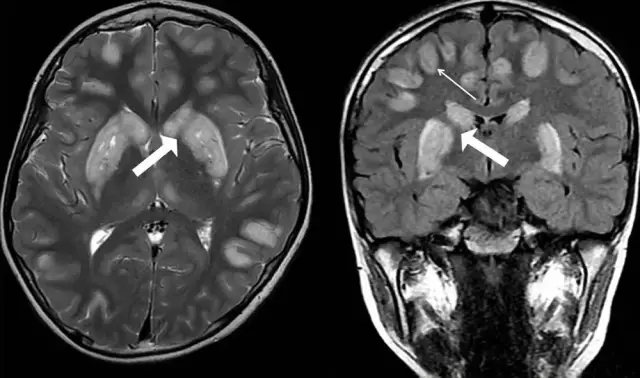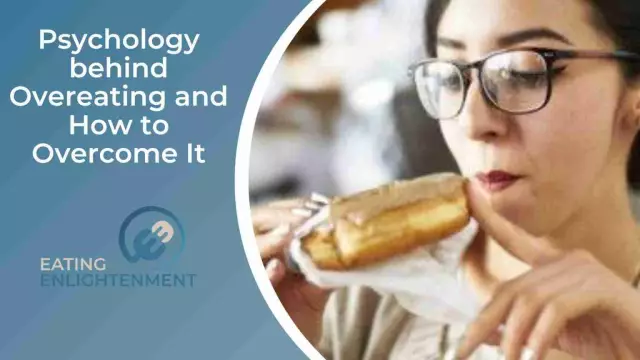- Author Rachel Wainwright wainwright@abchealthonline.com.
- Public 2023-12-15 07:39.
- Last modified 2025-11-02 20:14.
Binge eating

Overeating is an eating disorder characterized by the ingestion of excess food and the inability to stop at the right time.
Reasons for overeating
In modern society, regular or occasional overeating is common to almost everyone. Many people experience the consequences of this disease on themselves, but do not always attach importance to them.
Common causes of excess food intake are:
- Insensitivity of the human stomach to small changes in the amount of food due to the ability to stretch, so a feeling of fullness appears only 15-20 minutes after a meal;
- Loss of selectivity in relation to food, that is, when choosing, people are guided not by the usefulness and nutritional value of the product, but by looking at its appearance, aroma, availability, ease and speed of preparation. In addition, numerous advertisements affect the subconscious of a person;
- Disguising the need for water (thirst) or nutrients under the feeling of hunger. This reason for overeating is due to the fact that instant food, which is increasingly consumed by modern people, is practically devoid of vitamins, useful amino acids, micro- and macroelements;
- Giving food a new meaning that is different from the true one (replenishing energy costs). For example, a business lunch in a restaurant, when it is assumed that all guests will eat, regardless of whether they are hungry;
- Psychological overeating. This group includes "seizing" stress, bad moods or tragic events, low self-esteem and self-doubt, food as a consolation.
Overeating symptoms
Having understood the reasons for excessive food consumption, it is necessary to find out the signs of this disorder in order to take timely measures and not bring the situation to obesity.
So, the main symptoms of overeating are as follows:
- Weight gain or persistent weight fluctuations;
- Sleep disturbance. After overeating, it is difficult for the body to fall asleep, because the digestive processes continue;
- Failure of the gastrointestinal tract, a feeling of discomfort (increased gas production and bloating);
- Absorption of food at any time, even in the absence of hunger;
- Eating more food while maintaining the same daily routine and lifestyle;
- Uncontrolled eating, such as watching TV or reading. Distractions not only make it difficult to enjoy the aroma and taste of food, but also make it difficult to determine when you are full;
- Depression resulting from the above symptoms of overeating.
Nutritionists also identify such psychological manifestations of gluttony as: the desire to eat alone, an inner sense of guilt and self-dislike.
The consequences of overeating
The danger of overeating is so serious that doctors insist that you should get up from the table with a slight feeling of hunger. Otherwise, metabolic disorders will not keep you waiting, which will affect the work of all internal organs.
The first consequences of overeating hit the heart. A person's weight grows, and with it all organs increase, so the heart has to saturate a larger space with blood. Heart contractions are intensified, and the muscle walls of the human "motor" thicken. As a result, hypertension and blood pressure problems arise.
The second organ that suffers after overeating is the liver. When the amount of essential fats is exceeded, it becomes their immediate source. Almost all cells in the body are filled with fat. This seriously affects not only the liver and heart, but also the intestines - the entire intestinal tract suffers. Cases of diseases such as cholecystitis, gastritis, colitis and chronic pancreatitis are on the increase.
Another consequence of overeating is disruption of the hormonal cycle due to thyroxine deficiency. Women have problems with menstruation, and this threatens infertility. In men, erection is impaired.
It is also worth noting that excess weight is an additional burden on the spine and joints, which wear out ahead of time.
How to avoid overeating
You can cope with overeating on your own, but you need to constantly monitor food intake. Basic rules to follow:
- Eat on time, concentrate on food and not be distracted;
- Stop all snacks by gorging on main meals;
- Always eat while sitting, as this helps to adhere to the regime and not be distracted during the meal;
- Do not turn food into a reward or stimulant, you can find other ways for this;
- Try not to eat in the first 15 minutes after coming home, as fatigue and hunger are one of the reasons for overeating.
Overeating treatment
Eating disorders are difficult to identify, since shame, denial and secrecy are loyal companions of these diseases, so the disease may remain undetected for a long time. The disorder is only recognized when a person seeks help with weight loss or wants to get rid of health problems caused by obesity.
There are no studies that diagnose overeating. If this disorder is suspected, the doctor examines the patient's history, prescribes a series of examinations and tests to rule out physical pathologies. If, as a result of these manipulations, no physical illness is detected, the specialist refers the person to a psychologist who can diagnose and treat symptoms of overeating.
If you cannot cope with the disease on your own, you can consult a doctor who will prescribe medications that reduce appetite.
Overeating problem in children

The culprits of an eating disorder in children are almost always parents who, by all means, strive to feed the child even when he does not want to eat at all. After overeating, the baby's stomach stretches and holds much more food than the child's body needs.
In addition, adults come up with various distracting maneuvers, for example, feeding a child while playing or watching cartoons, which absolutely should not be done. With this approach, the process of food consumption becomes uncontrolled and automatic, the baby develops a bad habit of snacking while reading a book or watching TV, and all this together leads to obesity.
The negative consequences of overeating are obvious, but it is worth noting that not only regular consumption of large amounts of food, but also one-time holiday gorging can lead to them. You should not go on a visit to try all the dishes on the table, but to chat with friends or relatives. It must be remembered that even a single excess of the permissible amount of food is fraught with serious health problems.
Found a mistake in the text? Select it and press Ctrl + Enter.






